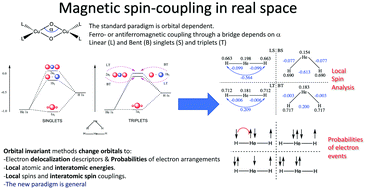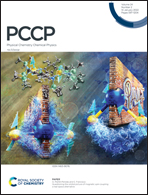Questioning the orbital picture of magnetic spin coupling: a real space alternative†
Abstract
The prevailing magnetic spin coupling paradigm is based on a one-electron picture, and is therefore orbital dependent and unsatisfactory from a physical point of view. We examine it under a truly invariant real space perspective, focusing on the role of electron delocalization. We show that this view, compatible with orbital thinking, overcomes its limitations. By examining simple model systems we show that it is electron delocalization that drives any singlet–triplet gap, and that delocalization and ionic mixing are two sides of the same reality. It is in the end delocalization, fostered or hindered by the specific structure of a system, that lies behind its preferred magnetic coupling mode. In the case of superexchange-mediated coupling through atomic bridges, we also point out the non-essential role of the bridge's electrons in setting up singlet–triplet preferences. We show that the use of real space thinking allows for tuning singlet–triplet gaps using knobs that are not easily grasped from the orbital standpoint, opening new avenues in the design and control of molecular magnets.

- This article is part of the themed collection: 2021 PCCP HOT Articles


 Please wait while we load your content...
Please wait while we load your content...